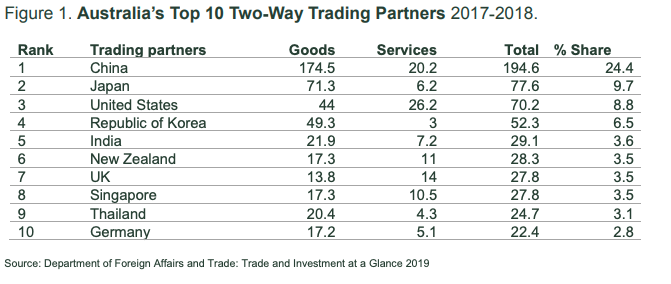Australia at risk from another trade war - but no one’s talking about it

A trade dispute that stretches back to World War II poses as “significant” a threat to Australia as the US-China trade war, a strategist has warned.
Related story: South Korea drops Japan from 'white list' in trade row
Related story: GRAPHIC-Asia seeks ways to cope with trade war's hit to China demand
Related story: South Korean leader calls for closer ties with North Korea
The trade dispute between South Korea and Japan began over post-World War II reparations claims but has gone on to see Japan tighten export restrictions on certain chemicals needed to make smartphone display panels and semiconductors against South Korea, senior investment strategist Investment Solutions Group at State Street Global Advisors, Raf Choudhury said in a commentary note on Wednesday.
What has led South Korea and Japan to these trade tensions?
Japan and South Korea in 1965 signed a treaty forcing Japan to pay compensation for alleged brutalisation of Koreans after the country was annexed in 1910.
However, those reparations flowed into developments, rather than to the victims of the crimes leading to civil unrest in South Korea. In 2013, a lower court decided that the Korean victims were owed compensation from Japanese companies, reigniting tensions with Japan, which had perceived the matter to be at rest.
The court later ordered the respective Japanese companies’ assets in South Korea be seized, leading to Japan cutting South Korea from its export ‘white list’, although the country did not say this was retaliation. But the decision means South Korean companies selling “strategic” goods will need to fill out five forms, rather than the previous three, to do trade with Japan, and the previous five-day approval process will now take 15 days.
Seoul has in turn cut Japan from its list of countries with preferential trade deals.
Japan’s trade minister, Isshu Sugawara, said the move was “regrettable”.
“The Trade Ministry will continue to urge the South Korean trade authorities to fulfill their responsibility to explain this to the international community,” he said
What is the impact for Australia?
The escalating tensions are bad news for Australia, Choudhury said, noting that China, Japan, the US and South Korea make up Australia’s top four two-way trading partners.
“It is unlikely that there will be a resolution in the near term and while South Korean protests call for the boycotting of Japanese made goods, Japanese tourism is also taking a hit as well as the manufacturing sector,” Choudhury said.
“South Korea in turn is seeing a fall in exports, down 14 per cent in August (on a year on year basis).
“With close ties to all four countries involved in trade disputes, the RBA will be keeping a close eye on the impact on global growth and may (as is expected) need to cut rates below 1 per cent before the end of the year.”

“While we are seeing an increase in the politicization of trade, it is not the exclusive instrument of the US and China. The latest eruption in trade wars is between Japan and South Korea and is just as significant for Australia,” Choudhury said.
He said South Korea’s removal from Japan’s export white list means South Korean companies now need to go through a protracted approval process which in turn puts strain on supply chains for Samsung and SK Hynix, among others.
“It now poses a threat to the world’s tech supply chain and the global economy,” he said.
Yahoo Finance’s All Markets Summit is on the 26th of September 2019 at the Shangri-La, Sydney. Check out the full line-up of speakers and agenda for this groundbreaking event here.

 Yahoo Finance
Yahoo Finance 
